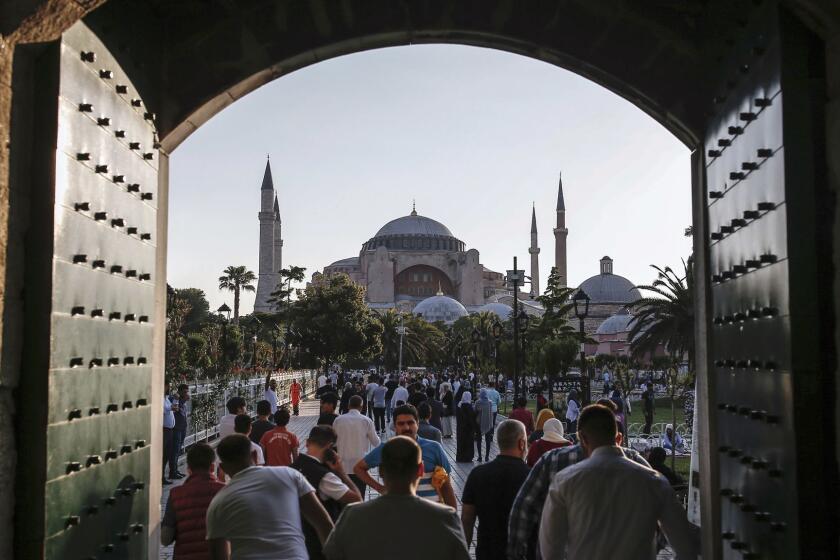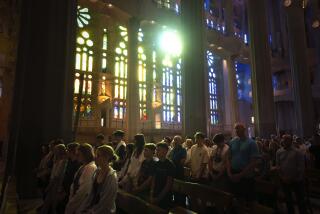Museum or mosque? Turkey debates future of iconic Hagia Sophia
ISTANBUL, Turkey — In its more than 1,400-year existence, the majestic domed structure of Hagia Sophia in Istanbul has served as the Byzantine Empire’s main cathedral, a mosque under the Ottoman Empire and a museum in modern Turkey, attracting millions of tourists each year.
The 6th century building is now at the center of a heated debate between nationalist, conservative and religious groups who are pressing for it to be reconverted back into a mosque and those who believe the UNESCO World Heritage site should remain a museum, underscoring Istanbul’s status as a bridge between continents and cultures.
On Thursday, Turkey’s Council of State began considering a request by a group that wants Hagia Sophia to revert to being a mosque and that argues the historic structure was the personal property of Ottoman Sultan Mehmet II, who conquered Istanbul. A state attorney urged the council, which is Turkey’s highest administrative court, to reject that request, state-run media reported.
A decision is expected within two weeks.
President Recep Tayyip Erdogan, who leads an Islamic-oriented party, has previously spoken about possibly changing Hagia Sophia’s status to a mosque but has said his government would await the Council of State’s decision.
Analysts believe that Erdogan — a populist, polarizing leader who in nearly two decades in office has frequently blamed Turkey’s secular elites for the country’s problems — is using the debate to consolidate his conservative base and to distract attention from Turkey’s substantial economic woes.
Five times a day, the loudspeakers affixed to the spires of some 90,000 state-run mosques crackle to life, and the Islamic call to prayer bathes the streets of Istanbul and other Turkish cities.
Erdogan “feels the pressure of popular support dwindling and therefore he wants to use issues that he hopes will remobilize his right-wing base around nativist, populist, anti-elitist topics,” said Soner Cagaptay, author of the book “Erdogan’s Empire” and a Turkey analyst for the Washington Institute.
Built under the Byzantine Emperor Justinian, Hagia Sophia was the main seat of the Eastern Orthodox church for centuries, where emperors were crowned amid ornate marble and mosaic decorations.
Following the 1453 Ottoman conquest of Constantinople — the city that is now Istanbul — four minarets were added to the terracotta-hued structure with cascading domes, and the building was turned into an imperial mosque.
The building opened its doors as a museum in 1935, a year after a decision to do so that was spearheaded by secular Turkey’s founder, Mustafa Kemal Ataturk.
In a dimly lit Istanbul club, young men and women smoke cigarettes and dance to a mix of synthwave, dissonant electronica and post-rock.
Islamist groups, however, strongly object to its status as a museum. Large crowds have gathered outside Hagia Sophia on the May 31 anniversary of the city’s conquest to pray and demand that it be restored as a place of Muslim worship.
In the past few years, Turkey has been allowing readings from the Quran inside Hagia Sophia, and Erdogan himself has recited prayers there. This year, he oversaw by video conference the recital of the “prayer of conquest” on the anniversary of the Ottoman conquest.
On Tuesday, Istanbul-based Ecumenical Patriarch Bartholomew I, considered the spiritual leader of the world’s Orthodox Christians, noted that Hagia Sophia had served as a place of worship for Christians for 900 years and for Muslims for 500 years.
“As a museum, Hagia Sophia can function as a place and symbol of encounter, dialogue and peaceful coexistence of peoples and cultures, mutual understanding and solidarity between Christianity and Islam,” he said, then warned: “The potential conversion of Hagia Sophia into a mosque will turn millions of Christians across the world against Islam.”
Voters in Istanbul delivered a stunning victory to Turkey’s secular opposition in a repeat election for mayor Sunday.
U.S. Secretary of State Michael R. Pompeo also urged Turkey on Wednesday to keep Hagia Sophia as a museum, to serve as “an exemplar of its commitment to respect faith traditions and diverse history.” He called on the government in Ankara to ensure the structure remains “accessible to all.”
Hours later, Turkish Foreign Ministry spokesman Hami Aksoy said the issue was a domestic one. “Hagia Sophia, like all cultural assets on our lands, is the property of Turkey,” he said.
Turkish media reports say the government was considering the possibility of keeping Hagia Sophia open to tourists even if it were turned into a mosque. That status would be similar to Istanbul’s Blue Mosque, which sits right across from Hagia Sophia and functions both as a house of worship and a tourist spot.
Hurriyet and other media have reported that Hagia Sophia could be reconverted into a mosque by a public holiday on July 15, when the country marks the fourth anniversary of the foiling of an attempted coup.
More to Read
Sign up for Essential California
The most important California stories and recommendations in your inbox every morning.
You may occasionally receive promotional content from the Los Angeles Times.













